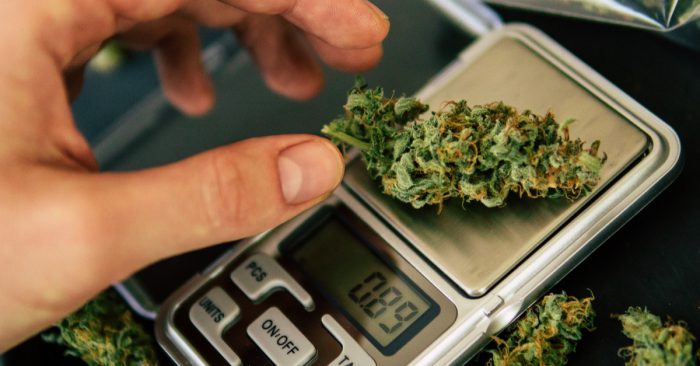Multiple pieces of cannabis legislation are getting floor time in Congress this week.
Editor’s Note: The senate appropriations bill this piece is centered around passed. More on that here. This article has been archived and will receive no further updates.
Quite a few cannabis bills have already grabbed Congressional floor time this year. While the federal government still puts cannabis in a legal class alongside drugs like cocaine and heroin, more than half of U.S. states have some type of legal cannabis access.
The U.S. government has been designed to give states a great deal of independent authority. However, this discrepancy between state and federal law leaves state cannabis programs in a precarious grey zone. And it leads to obstacles, such as cannabis providers having difficulty doing banking or obtaining property. It also leaves patients and consumers without consistent legal protection for employment or access from state to state.
This week, however, may see some massive breakthroughs in cannabis legislation. Congress is set to debate almost a dozen cannabis-related amendments to a large-scale appropriations bill that was submitted by the House Rules Committee last week.

Bill Amendments Will Address Cannabis Regulation
The primary goal of the Appropriations Bill is to fund multiple departments of the Federal Government for the 2020 Fiscal Year.
The amendments to the bill cover multiple aspects of cannabis and CBD regulation in an open market. This includes things such as, preventing the Justice Department from interfering in state cannabis programs, creating FDA regulations for CBD, and allocating DEA funds for substance abuse education programs.
The Big Guns
Perhaps the most significant amendment to the Appropriations Bill is a measure preventing Federal Justice Department funds from interfering with state laws around distribution, use, possession, and growing of cannabis.
Representatives Tom McClintock (R-CA) and Earl Blumenauer (D-OR) proposed the bipartisan amendment. The amendment is very similar to a cannabis bill which almost passed in 2015.
There was, however, an oversight in Blumenauer and McClintock’s originally proposed amendment. While the amendment protected state cannabis programs, it did not extend the same protections to US territories or Washington DC.
Washington DC has had a medical cannabis program in place for over 10 years, including recreational use since 2015. Additionally, the US Virgin Islands enacted a medical cannabis law this year. The exclusion of their jurisdictions in other amendments prompted lawmakers from these places to submit amendments of their own.
Rep. Eleanor Holmes Norton (D-DC) filed a separate measure extending protection from federal interference to Washington DC’s medical and recreational cannabis programs. Rep. Stacey Plaskett (D-VI) also submitted a medical cannabis protection rider covering the Virgin Islands’ new medical cannabis program.
Amendments Address Veterans’ and Tribal Cannabis Programs –
Earl Blumenauer is one of Congress’ leading advocates for cannabis reform. In an interview with Marijuana Moment, Blumenauer spoke of the ongoing battle to protect state cannabis programs. He said, “In 2014, we successfully passed amendments to protect state cannabis programs. It’s now 2019. It’s past time to protect all cannabis programs, including adult-use.”
Blumenauer is also working on the submission of 4 other amendments protecting cannabis programs in tribal areas. These are in addition to the state-protections amendment. There are two amendments to protect all tribal cannabis programs including recreational; one for areas in states where cannabis is legal, and one for states where it’s not. The other two amendments specifically protect medical cannabis programs in tribal areas, in states with medical programs and those without.
Blumenauer also seeks to address protections for veterans after a letdown on similar cannabis bills proposed earlier this year. He proposed amendments to the appropriations bill preventing Justice Department funds from being used to penalize Department of Veteran’s Affairs (VA) workers and doctors.

Further Amendments and Cannabis Legislation
Rep. Alexandria Ocasio-Cortez (D-NY) also submitted an amendment to allocate $5 million of DEA funding currently used for drug enforcement “to the Comprehensive Opioid Abuse Program in keeping with the growing consensus to treat drug addiction as a public health issue.”
Editor’s Note: This amendment also passed.
She originally proposed $30 million to be used towards education programs, but was pressured to scale back the proposal. However, the original $30 million proposal doesn’t sound so radical when considering that the DEA will receive a $90 million dollar raise from their 2019 budget as part of the appropriations bill.
If passed, these could be major steps towards federally legal cannabis in the United States.
Unfortunately, representatives are proposing countermeasures as well. Two anti-drug amendments, both proposed by Rep. Glenn Grothman (R-WI), aim to restrict Department of Agriculture funds. The bill would concede funds if the department testifies before Congress that recipients of benefits from its programs will undergo drug testing before receiving department funding.
Editor’s Note: Grothman ultimately withdrew these amendments.
Despite all of this, cannabis legislation amendments are still in early stages. Chairman James McGovern (D-MA) says that he plans to hear out any cannabis amendments submitted with the proper protocol. This a major change from the previous chair, Rep. Pete Sessions (R-TX), who spent his time as chair routinely blocking the hearing of cannabis bills.





